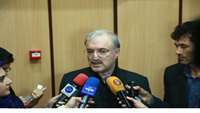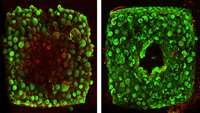Study identifies cells required for the development of a healthy uterus
Knowledge of the biological processes involved in the development of the uterus is important for understanding uterine health and fertility. A research team led by investigators at Massachusetts General Hospital (MGH) has uncovered important insights on a type of cell that is critical for the formation of a functioning uterus.
Biotech company 3D-prints a miniature human heart from stem cells
It’s not science fiction anymore: 3D-printing a human heart is now a reality.
Celebrating World Marrow Donor Day in Iran
Celebration Ceremony of World Marrow Donor Day was held in Tehran with presence of Dr. Namaki, minister of health and medical education, Dr. Janbabaie, deputy minister of health, Dr. Hamidieh, secretary of the council for development of stem cell sciences and technologies, Dr. Shadnoush, head of transplantation and diseases management Center, Dr. Sayyad, secretary for Iranian National Stem Cell Donor Network (INSCDN) and number of donors and patients.
HLA registry centers to be set up nationwide
HLA registry centers will be established in all provinces across the country, Health Minister Saeed Namaki has said. “Both stem cell transplant and medication are expensive, but with the support of insurance, we tried to reduce the prices for transplant recipients,” he added.
Space Station Research Into Brain Cells Aims to Better Understand Parkinson’s, MS
Research conducted aboard the International Space Station will look at how nerve cells interact with key immune cells of the brain in low-gravity conditions. The goal is to better understand nervous system damage in Parkinson’s disease and multiple sclerosis (MS) — and help improve their treatments.
Liver transplants could be redundant with discovery of new liver cell
Researchers at Kings College London have used single cell RNA sequencing to identify a type of cell that may be able to regenerate liver tissue, treating liver failure without the need for transplants.
Heart cells’ environment a potentially major factor in heart disease
When it comes to heart disease, the health of the scaffold where cardiac cells grow may be a much bigger factor than previously believed.
CRISPR used to reduce symptoms of muscular dystrophy in mice models
A team of researchers from Canada, the U.S. and Sweden has found that editing a gene involved in producing proteins that promote muscle strength in muscular dystrophy mice models could reduce symptoms. In their paper published in the journal Nature, the group describes their experiments with mice and what they learned from them.
Mesenchymal Stem Cell Study Takes a Step Towards the Cell-free Treatment of Diabetes
Previous studies on islet regeneration from the laboratories of Gilles A. Lajoie (Western University) and David A. Hess (Robarts Research Institute, London, Ontario, Canada) revealed that transplants of human bone marrow mesenchymal stem cells (hBM-MSCs) led to the emergence of small recipient‐derived islet‐like structures in the pancreas, thereby producing the β-cells required to battle the insulin deficiency associated with both type 1 and type 2 diabetes [1-3]
A swifter way towards 3D-printed organs
20 people die every day waiting for an organ transplant in the United States, and while more than 30,000 transplants are now performed annually, there are over 113,000 patients currently on organ waitlists












